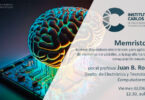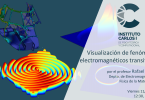Speaker: Prof. Jorge Mejías, Computational Neuroscience Lab, Amsterdam University
Our brain performs cognitive functions that are of great importance to our daily life -from remembering the address of our home to deciding when to cross the road. Traditionally, functions like work memory (a particular kind of short term memory) to the multisensorial integration have been studied by associating each of these functions with specific areas of the brain, in particular with the prefrontal and parietal cortex respectively. However, recent studies suggest that cognitive functions arise from the interaction of multiple brain regions, not the dynamics of simple specialized areas. The ways in which areas all through the brain can coordinate to give place to the emergence of these cognitive functions is still a mystery, since the majority of current theories don’t consider a distributive approach.
In this talk, I will present some of the most recent results that use theoretical and computational models from the realm of neurophysics to propose some solutions so these dilemmas. In the first part of the talk, I will explain how the classical mechanisms from work memory, based from a physical point of view in an attractor dynamic, can extend to explain the emergence of a distributed work memory, observed in recent studies. Our models predict a more robust work memory (against noise, distractions or damage) than traditional models, and more in line with experimental evidences. In the second part, I will explore the idea that the integration of information from many sources doesn’t occur in predetermined brain areas. Instead, our models predict that the specific conditions of the environment or the individual (like the level of noise or the luminosity of the environment, mental state, etc.) can determine in a flexible way which particular brain regions integrate the signals from our senses. Both results indicate that the mental processes associated with memory and perception are distributed through large scale complex neural networks, conformed by heterogeneous and highly non-linear circuits
Day: friday 8th April, 2022
Time: 12:30
Place: F-1 classroom (Faculty of Sciences, Physics building)








